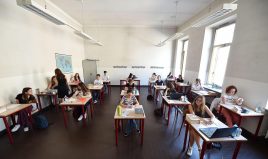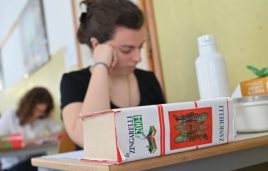
The final secondary school exams, a rite of passage into adulthood awaited (and dreaded) by all Italian students, are about to begin, structured according to last year’s format: two national written tests and an interview; an examination board made up of internal and external members and an external chairman. On 19 June, more than 500,000 students will sit the first test, the Italian essay. The second written test will take place the following day and will cover one or more of the main subjects of the study programme. On the Monday following the written tests, 24 June, the oral tests, or interviews, will begin, although for some high school students exams will be postponed by a few days due to the second round of the municipal elections. Is this exam still relevant in its current form? Is it a rite of passage or an evaluation exercise, given that a very high number of students pass it? On this subject, SIR interviewed a dedicated and sensitive teacher and educator, Eraldo Affinati, a Rome-based writer and teacher who, with his wife Anna Luce Lenzi, founded the Penny Wirton School in 2008 (which now runs over 60 schools across Italy), offering free Italian-language classes to immigrants.
“For many adults, the high-school final state examinations are seen as a relic of the past,” he said. “But let us never forget
for the young people preparing for these exams, they constitute the first real exam.
Indeed, the selection process took place already in the previous years, right up to the admission to the final exams, which a very small proportion of candidates are bound to fail nonetheless. The written and oral exams, with all their rituals, now seem a mere formality, given the ridiculous percentage of unsuccessful candidates. Nevertheless, their symbolic value remains strong, not least in terms of the marks obtained.”
Professor, the cultural scenario is dynamic and constantly changing…
It has been changed by the digital revolution. In fact, the latter has altered the relationship with reality and with ourselves, and this is true not only for young people. Consider the different ways of accessing knowledge now available to us and the consequent need for value-based categories to help us navigate the web. Think also of the importance that needs to be attached to experience, rather than being satisfied with virtual reality. Or the cognitive systems involved in fragmented reading. Concentration, checking sources, practising, analysing, learning: all these processes are now processed by the latest technologies. The examination system, on the other hand, is the product of twentieth-century hermeneutic criteria. It is as if the school-leaver’s examination were an outdated mechanism. However, students are accustomed to this discrepancy because it was always there as they grew up.
In fact, some of them feel the fascination of the civilisation that has just ended and yearn to rediscover it.
Paper books, for example, have not disappeared but continue to play an essential role, not least for the younger generation.
 At Penny Wirton, you have had the opportunity to meet many high school students who teach Italian to their immigrant peers. How would you describe them?
At Penny Wirton, you have had the opportunity to meet many high school students who teach Italian to their immigrant peers. How would you describe them?
Observing these young people involved in the PCTOs (Paths for Transversal Skills and Orientation) gives me hope. These students, who, like all their peers, have studied on large and small screens, enjoy the special human relationship that Penny Wirton schools offer. They meet students their own age from Africa, the Far East, Slavic countries, South America, whom they would never have met if they had not been given the opportunity we gave them. They teach Italian using our manual, our teaching materials, notebooks and mobile phones. They constantly switch from pen to automatic translator, perfectly embodying the union of the old and the new worlds.
For two years there has been an immaterial ‘war’ – the Covid pandemic – which has claimed more than 120,000 lives and left a heavy burden of social and psychological devastation. Now, and for the past two years, there have been two terrible conflicts, this time an actual war, in Ukraine and Israel. How are young people living through this, and how can we ensure that this experience becomes an opportunity for human growth?
Although on the outside they may seem to be dismissing the ongoing conflicts, very often they are experiencing them deep inside. I have seen this when I sit them next to Ukrainian refugees, or when African children describe the vicissitudes of reaching the island of Lampedusa. On the last day of school this year at Penny Wirton, we had a small party. The highlight for me was seeing some of our secondary school girls dancing with some recently arrived Egyptian students. The Egyptian boys, usually exuberant, seemed almost intimidated by the girls, perhaps because they were not used to a mixed male-female environment. Some Gambian and Ethiopian ladies arrived and joined the dance with great nonchalance. Then, with the children present, everything became even more natural and relaxed. At the sight of this group, I thought:
This is our very small way to dispel the winds of war.
A survey by Skuola.net shows that 51 per cent of about one thousand high school graduates would rather study the period after the Second World War and the second half of the 20th century than “talk about the prehistoric era and the dinosaurs.” The issue of a possible revision of study programmes was recently raised even by Education Minister Valditara…
There has to be a proper balance between the two. The school syllabuses should be carefully revised. More space should be given to studying 20th century history and the ensuing historical period, without eliminating ancient history, which I consider fundamental. A lot of work should be done on textbooks, which should be much more succinct and to the point. There should be less scholarly material and more historical narrative; less technical apparatus and more content.
The educational system is the driving force that connects the past and the future, and a tool that shapes our understanding of the past. We should not treat it as a dusty box to be passed on from one generation to the next, but as a vital propeller, not least because whenever a young person tackles the same subject, tradition is renewed.
 The Italian essay, however you look at it, remains the most important exam because of its symbolic value. A survey by Studenti.it found that just under half of final-year students use generative artificial intelligence to create essay templates for the exam. Every year, in retrospect, a debate is opened on the topics proposed by the Ministry of Education. What characteristics do you think they should have?
The Italian essay, however you look at it, remains the most important exam because of its symbolic value. A survey by Studenti.it found that just under half of final-year students use generative artificial intelligence to create essay templates for the exam. Every year, in retrospect, a debate is opened on the topics proposed by the Ministry of Education. What characteristics do you think they should have?
It is not the topics that are important, but the way in which they are approached. In this respect, artificial intelligence is not a decisive factor. The same could be said of literature: the essay per se is of little importance. What matters is the style, the unique voice of the author. How many accounts have been written describing our tragic retreat from Russia in the Second World War? Countless. So why is it that only ‘The Sergeant in the Snow’ by Mario Rigoni Stern, together with a few other texts, reaches the quality of a masterpiece? Every student taking the Italian state examination is expected to make his or her own original contribution to the written Italian exam.
Writing remains the best way of assessing a young person’s maturity to this day.
Finally, there is the interview, or oral exam, which young people always approach with apprehension, fearing that their anxiety will impact on their performance. Are teachers expected to judge or to listen and encourage? In short, what “approach” should they adopt towards the graduating students?
The teacher’s gaze on the student taking the exam should always be one of sympathy and understanding, but no less demanding or rigorous. Don Lorenzo Milani’s phrase ‘I care’ didn’t mean: you can do whatever you want and give up on your goals. Rather, it meant: I care deeply about you as a person, and therefore
I will do my best to get you to the finish line, and I will accompany you along the way.
I will always have to take into account your starting point and reward the progress you have made, even before the final achievement. If you miss the target, my colleagues and I will share the responsibility for that failure. If we feel that we have been challenged when things have gone wrong, then we, as teachers, will have truly experienced the true meaning of our profession.












